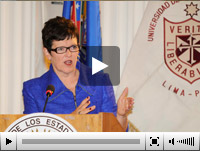- English
Cátedra de las Américas
Thirty Séptima Cátedra - Jennifer Mary Shipley
Thirty Séptima Cátedra - September 22, 2009
"Peace, Security and Participation: The Case for Shared Societies"
Orador:
Jennifer Mary Shipley, Ex Prime Minister of New Zealand
In the XXXVII Lecture of the Lecture Series of the Americas, Right Honorable Dame Jennifer Mary Shipley, former Prime Minister of New Zealand, shares her expertise on the topic of social cohesion and inclusive societies. Dame Shipley is the co-chair of the Shared Societies Project at the Club de Madrid, an organization of more than 70 democratic former Heads of State and Government from 50 countries committed to leadership in the promotion of democratic values. Dame Shipley describes a shared society as socially cohesive, safe, and just, and based on human rights and tolerance. She emphasizes social inclusion as building a common ground where everyone feels safe to embrace their potential and celebrate differences.
Dame Shipley uses the case of the Maori people in New Zealand to explain policy and best practices that foster social inclusion. She begins with stating that equal citizenship, like the Maori were given under the Waitangi Treaty in 1840, does not amount to equality, and assimilation leads to alienation and a detachment from cultural roots. She explains that reversal of the exclusion of the Maori people began in the last quarter of the 20th century, when both the Maori and the Pakeha (people of European and Asian descent) began to recognize what was lost. The state focused on nursery school education in the Maori language and slowly integrated Maori primary and secondary education. The result was Maori students began performing much better when they entered an English medium classroom, and the whole Maori community felt in control of the education of their youth. In terms of healthcare, the Maori people were allowed to set up their own public clinics that integrated Maori tradition and modern medicine. Higher numbers of Maori began going to see a doctor and the overall health of the population improved. Dame Shipley uses the example of the Maori regaining their fishing rights and building the largest fishing company in New Zealand to emphasize the economic benefits of social inclusion.
In addition to the participation of previously marginalized classes in society, she notes that social cohesion leads to political and social stability lowers public costs, increases capital investment. For those reasons, Dame Shipley believes that every leader should internalize the economic argument for shared societies as a true benefit to civil society as a whole.
The Club de Madrid’s Shared Societies Project has developed 10 Commitments for Shared Societies based on government and legal responsibility for social cohesion, the need for a voice for all social groups, economic and educational opportunity for everyone, safe physical environments, and the promotion of understanding, shared vision, and tolerance. Dame Shipley emphasizes that shared societies are possible, and it is all a matter of leadership.

